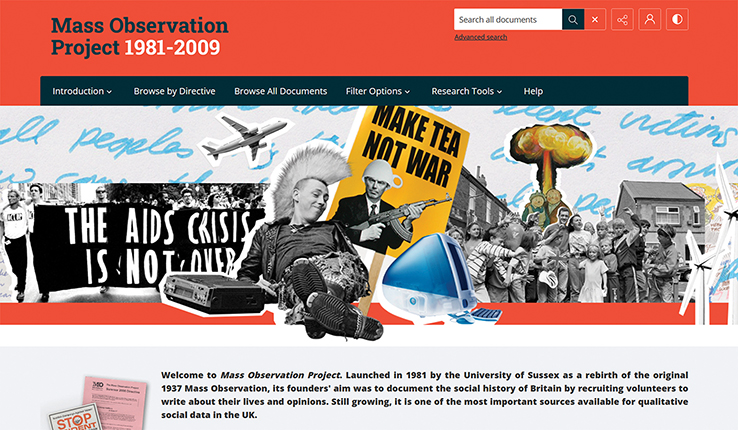Mass Observation Project, Module II: 1990s | Reference eReviews
Adam Matthew Digital’s Mass Observation Archive collects surveys and directives issued by the Mass Observation Project from the 1980s to the 2000s that documented Britons’ opinions on current events, political movements, and everyday experiences. The Mass Observation Project is particular to the UK, but many of its themes have historical significance that makes them relevant to researchers of other regions. The collection is well organized and easy to use; a valuable addition for institutions.
Mass Observation Project, Module II: 1990s
CONTENT
Adam Matthew Digital’s Mass Observation Archive collects surveys and directives issued by the Mass Observation Project to participants (“observers”) from the 1980s to the 2000s. The study documented British citizens’ opinions on current events, political movements, and everyday experiences. Directives were sent to observers on a generally quarterly basis, instructing them to share views on specific topics; in their responses, participants detailed their feelings and opinions. Original materials are archived at the Keep at University of Sussex.
Whereas Module I included directives and responses submitted between 1981 and 1990, Module II covers 1990 through 1999. A forthcoming module (available in 2022) will compile data through 2009. The current modules include all responses submitted to the Mass Observation Project, except those for which permissions were not granted. Survey responses are anonymized, and details are redacted where needed.
USABILITY
Users can search directives by decade, browse all documents, or search the archive. Though only materials from the 1980s and 1990s are available, users can preview the list of directives coming in 2022.
Themes covered in this module include social divisions, relationships (including gender roles and sexuality), the Gulf War, literacy, technology, community, foreignness, crime, drugs, mad cow disease, unpaid labor, the death of Princess Diana, and the new millennium.
Users can find all available responses to a directive by selecting it from the “browse by directive” list. They can also filter documents by key topics (gifts, habits, Soviet Union, pets, societal attitudes, etc.) or by observer (anonymous and listed by numerical identifier). Both lists are searchable. Directives and responses are available as text-searchable scans. Each record includes links to related topics and additional relevant documents.
PRICING
Costs are determined by a range of factors that influence the size of potential user group, including but not limited to Carnegie Classification and full-time enrollment. Contact info@amdigital.co.uk for more information.
VERDICT
Building on the existing collection of directives from the 1980s, Module II creates new avenues for research. The Mass Observation Project is particular to the UK, but many of its themes have historical significance that makes them relevant to researchers of other regions. The collection is well organized and easy to use, and options to share and save searches, bookmark documents, and download images make it easy to engage in research without getting lost in the breadth of subjects discussed. Overall, this is a valuable addition for institutions that provide access to Module I or want to expand their selection of primary source materials covering the late 20th century.
Gricel Dominguez is a Librarian at Florida International University
RELATED
ALREADY A SUBSCRIBER? LOG IN
We are currently offering this content for free. Sign up now to activate your personal profile, where you can save articles for future viewing










Add Comment :-
Comment Policy:
Comment should not be empty !!!